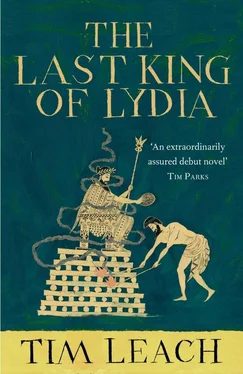Tim Leach - The Last King of Lydia
Здесь есть возможность читать онлайн «Tim Leach - The Last King of Lydia» весь текст электронной книги совершенно бесплатно (целиком полную версию без сокращений). В некоторых случаях можно слушать аудио, скачать через торрент в формате fb2 и присутствует краткое содержание. Год выпуска: 2013, ISBN: 2013, Издательство: Atlantic Books Ltd, Жанр: Исторические приключения, на английском языке. Описание произведения, (предисловие) а так же отзывы посетителей доступны на портале библиотеки ЛибКат.
- Название:The Last King of Lydia
- Автор:
- Издательство:Atlantic Books Ltd
- Жанр:
- Год:2013
- ISBN:9780857899200
- Рейтинг книги:5 / 5. Голосов: 1
-
Избранное:Добавить в избранное
- Отзывы:
-
Ваша оценка:
- 100
- 1
- 2
- 3
- 4
- 5
The Last King of Lydia: краткое содержание, описание и аннотация
Предлагаем к чтению аннотацию, описание, краткое содержание или предисловие (зависит от того, что написал сам автор книги «The Last King of Lydia»). Если вы не нашли необходимую информацию о книге — напишите в комментариях, мы постараемся отыскать её.
The Last King of Lydia — читать онлайн бесплатно полную книгу (весь текст) целиком
Ниже представлен текст книги, разбитый по страницам. Система сохранения места последней прочитанной страницы, позволяет с удобством читать онлайн бесплатно книгу «The Last King of Lydia», без необходимости каждый раз заново искать на чём Вы остановились. Поставьте закладку, и сможете в любой момент перейти на страницу, на которой закончили чтение.
Интервал:
Закладка:
The moment passed. One of the other Immortals tapped him on the shoulder, and Hyroeades fell into step with the rest of the men. He kept his eyes open for another moment when his companions would be distracted, when he might have an opportunity to escape. But no chance came, and they were past the temple of Nabu and at the palace gates.
The captain divided them again. Ten men concealed themselves as best they could outside the palace gates, and fifteen were chosen to go inside the palace. The ten were sure to die, buying time for the others, but they took up their positions without question. Hyroeades wondered if it were blind chance that he was chosen as one of the fifteen, or if the captain believed that he had the Gods’ blessing, and wanted to keep him close to the very end. He felt a strange, useless comfort in the thought that at least he would live a little longer than the men outside.
They headed up the steps, expecting at any moment the shout of alarm, the hail of javelins and sling stones that would end their lives. It did not come. Outside the unguarded entrance, they pulled off their muddied boots and cast them aside. Barefoot, like penitents before a temple, they passed through the gates.
The palace was deserted. Almost all of Babylon was attending the festival, but the king, so their spies reported, would not be there. Only he and a few of his guards would remain in the palace that night for, unpopular as he was, he appeared at as few public occasions as he could for fear of mockery. From time to time they heard someone passing through the corridors. A slave on some late-night errand, a wandering guard, a nobleman creeping from one bedchamber to another. In the empty palace, sound carried and echoed to such an extent that they could not tell if they were on the opposite side of the building or only a single corridor away.
Hyroeades found the emptiness unsettling. Great halls, built to hold hundreds, echoed their soft footsteps back to them. Kitchens with dozens of cooking pots and ceilings black with soot were empty and silent. It was as if the palace, perhaps even the entire city, had been abandoned in the wake of some great disaster, or as if the Babylonians, anticipating the fall of their city, had left it for some other world, melting away into the air in an act of collective magic.
Kings had ruled here for thousands of years, Hyroeades had heard. He could not imagine that the world could be so old. He wondered if, in all the centuries, intruders had ever stepped inside the sacred palace walls, if this was the first time armed foreigners had made it this far. Their presence had the feeling of desecration, of blasphemy. Somewhere, he was certain, a god was stirring to punish them. They had only a short time to complete their mission before he came for them.
They reached the stairwell that led to the royal chambers. After a moment’s hesitation, while he listened for some clink of armour above that might indicate that it was guarded, the captain led them up.
They were packed close together in the winding stairwell, designed so that few could hold it against many. A pair of guards above them could have held off fifty men. Hyroeades was reminded of the water tunnel, though now, rather than the smell of the river, the air was rank with the sweat of the men around him. Slowly and silently, they made their way to the highest level of the palace.
They were not alone. Close by, Hyroeades could hear talking in a language he did not understand. Though the tongue was unfamiliar, the tone he understood — bored men passing the time with idle stories. After the long silence it was almost a relief to hear other voices.
The captain looked around the corner and ducked back quickly. He held up both hands and extended all his fingers, repeated the motion. Twenty was the signal. Twenty men guarding the king’s chamber. Their luck, it seemed, had finally run out.
The captain pulled the man next to him close and whispered in his ear. The other man listened and nodded, then moved down the line, tapping a number of other men on the shoulder as he went. He hesitated beside Hyroeades, and looked back at the captain, who shook his head. The other man continued down the line, until he had touched nine other men. He beckoned to them to follow him back the way they had come.
The ten made their way silently back down the stairs. The captain, Hyroeades, and three others went into an empty chamber. They waited.
He thought of how easily he and the others would be replaced. The next day, fifty men would be summoned to serve the king. The Immortals, the ten thousand who had worn a hundred thousand different faces, the regiment that could never die. What did his life matter, if his place could be taken so quickly? He thought of how swiftly sons replaced fathers, infants replaced the elderly. Barely had you stopped breathing before you became an irrelevance, as though you had never lived at all. What did anyone’s life matter, king or soldier or slave, if they could be replaced in moments and the world go on without them? Our lives mean nothing, he thought to himself. My life means nothing.
Distant sounds, piercing in the silence, reached him from another part of the palace. War cries, the clash of swords. The other Immortals, he realized, had gone to cause a diversion. Somewhere, Hyroeades could hear some great copper gong being struck. The alarm, summoning the guards from around the palace to defend their king, calling the Gods to let them know there were intruders in a sacred place. Either way, he thought, at the Gods’ hands or the Babylonians’, we will all be dead soon.
They listened as the guards ran past and tried to count how many had gone, how many would remain for them to face. Once the footsteps had faded away, the captain crawled back out to look around the corner again. He looked back, and this time, he held up just two fingers.
The captain looked at each man in turn and nodded, giving an order and asking a question in one gesture. Hyroeades found himself nodding back, giving his consent without thinking. They stood and touched their swords together, then charged out into the corridor.
The two Babylon guards turned to face them, their faces frozen in shock even as they set their spears. The two Immortals in front, the captain and his second in command, died on those iron points. They must have known they would, pitting swords against spears, buying victory with their lives, and before the Babylonians could withdraw their weapons the others were on them, striking them to ground, their swords falling, rising dark with blood.
The others hurried into the king’s chamber, but Hyroeades remained at the entrance. He knelt and looked back to the stairwell, listening to the muffled screams from within as the king died.
He had been in Cyrus’s army for almost a decade, but he had always tried to find his place away from the fighting. Who knew how many deaths he had caused, leading the Persians into Sardis. But he had never killed a man with his own hands. And he would not kill one now. It was not much of an ambition at the end of a life, he thought. He wished he could have done something else, something better. He wished that he could have lived differently.
He heard the sound of feet pounding up the stairs, echoing louder as they drew closer. A dozen Babylonian guards came into view, their faces marked with the blood of his companions. They looked at him with death in their eyes.
As he saw them, saw their eyes fix on him, a terrible relief struck him. He knew then that he was going to die, that the time for choices was over and only one path lay ahead of him. He understood, at last, what courage was — when there are no choices but one. His dreams had given him other paths to follow, his hopes had made him a coward. Now, at the end of all hope, he knew he could be brave. He knew he could die well. He ran forward, his sword held high, and hoped that they would kill him quickly.
Читать дальшеИнтервал:
Закладка:
Похожие книги на «The Last King of Lydia»
Представляем Вашему вниманию похожие книги на «The Last King of Lydia» списком для выбора. Мы отобрали схожую по названию и смыслу литературу в надежде предоставить читателям больше вариантов отыскать новые, интересные, ещё непрочитанные произведения.
Обсуждение, отзывы о книге «The Last King of Lydia» и просто собственные мнения читателей. Оставьте ваши комментарии, напишите, что Вы думаете о произведении, его смысле или главных героях. Укажите что конкретно понравилось, а что нет, и почему Вы так считаете.












